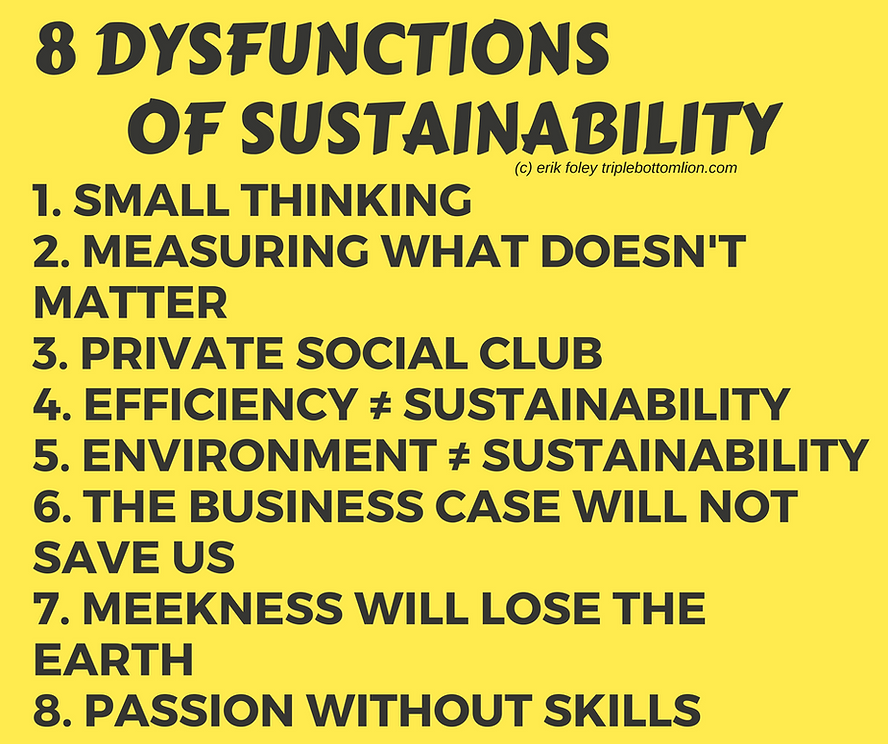The Eight Dysfunctions of Sustainability

An excerpt from a recent keynote in New York (2018)
"Sustainable development" was born from a historic moment and a warning to humanity. The concept was forged within the 900 days of global listening sessions, the Brundtland Commission held on five continents in the 1980s. Post WW II, economic and technological expansion was exploding but benefiting only the few and liquidating natural capital. "Sustainable development" was a global call for attention and action and a new direction. However, it has mostly become a culture that is unfit to fulfill it’s own mission.
My thesis is this: the work we need to do is not matched by the work culture we have assembled to do it.
My critique is not of the notion of sustainability, but of the culture I have observed in my work with companies, organizations and in my study of the field over 20 years. It is meant to both reclaim the original fullness of "sustainable development" but even more to point to the baggage we must leave behind. In a word, sustainability has to grow up.
The 8 Dysfunctions of Sustainability
There are eight dysfunctions of sustainability. Why do I call them “dysfunctions”? The Oxford dictionary defines dysfunction as “an abnormality or impairment in the function of the system.” We hear about dysfunctional families, dysfunctional companies, and even dysfunctional organs in the body. My father had Parkinson's disease which is a dysfunction of the brain's basal ganglia, predominantly in the substantia nigra region. When a dysfunction exists, the system doesn't work properly and will never reach its fullest potential.
I will just briefly introduce the 8 dysfunctions of sustainability here and explore each in greater depth in later posts.
- A small committed group of citizens won’t be enough Margaret Mead's famous quote is a favorite of the sustainability set (like myself) but the inconvenient truth is that it isn't entirely true and has created, I argue, a type of small thinking and rampant parochialism.
- We measure what we can manage even if it doesn’t matter: metrics, KPI's, OKR's, etc are essential but...we confuse outputs with impact and need to upgrade our understanding of how to measure what we are actually trying to achieve; as Jim Clemmer has said: "measurements that don't lead to meaningful action aren't just useful, they are wasteful."
- Sustainability as private social club: sustainability offices, officers, meetings and conferences, at least in this country, are decidedly and unfortunately monocultures; diversity is strength and if your team is too similar, it’s too small and too exclusive and therefore not fit for purpose. The white "green ceiling" is real and must be broken (See Green Insider's Club from Green 2.0.)
- Efficiency ≠ sustainability: the Jevons effect, rebound effects and backfiring are known psychological and behavioral economics phenomenon that accompany efficiency improvements and can lead to maintained or even increased usage (e.g. double the gas mileage but driving it twice as much) and has a "check box" effect (i.e. once we do it, we think we're "doing sustainability"); efficiency is a tool in the tool shed but there are many others and we need them all.
- Meekness will lose the earth: many efforts are slowed and ultimately killed by false humility and misguided ideological stances against using paper or electricity or vinyl or bothering people too much or filling people's in-boxes; sustainability people can be too nice
- The business case will not save us: it is entirely possible to do what is good for business, including protecting workers, safeguarding human rights, reducing resource consumption and waste production, and still destroy the planet and ultimately the value of the company
- Environment ≠ sustainability: the work is as much--if not more--about human well-being, equality and equity as it is about environmental protection; as Penn State's late Vice Provost of Educational Equity, the late Terrell Jones said: "You can't be a leader in sustainability without being a leader in diversity and inclusion." There has never been a truer statement.
- A passion for sustainability will leave you jobless: we have overemphasized a "passion for sustainability"; most sustainability teaching lacks rigor and overall, results-oriented learning objectives and we produce passionate students without skills
This excerpt from a talk I have in 2018 to a room full of sustainability professionals was somewhat prescient. This is less due to my own brilliance (check my college transcript) and more to some excellent mentors of mine at the time. I was channeling their frustrations--combined with my own--with this worthwhile and important field of work.
Reflection
If sustainability (or ESG) got kicked around a bit in 2023, 2024 and 2025, I would suggest that it had it coming. It paraded around too much like a quasi-religion and not as the very serious field of scientific, policy and business inquiry and action that it truly is. Of course, much of the so-called anti-ESG movement is itself a quasi-religious movement devoid of much evidence or logic, rampant with name-calling and senseless derision. My point here is not to prop up the anti-ESG movement but merely to suggest that sustainability professionals have a responsibility to take the field seriously, to act more generously, and to build a more inclusive coalition with those who think differently.